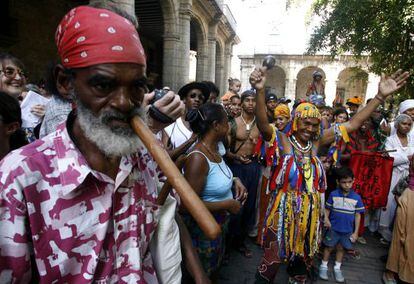Caricom moves forward in demanding slave trade reparations from Europe
Caribbean leaders come up with 10-point plan to ask for aid and investment

Caribbean nations on Monday began moving toward a new common strategy for seeking reparations from European nations for three decades of slavery.
The leaders of the 15 Caribbean Community (Caricom) nations meeting in St. Vincent and the Grenadines adopted a common 10-point plan aimed at not only seeking compensation but also demanding a public apology, the cancelation of debts held with their former colonial powers, and a commitment from Europe to invest in their nations.
Caribbean and European officials are expected to discuss the issues in June.
Last summer, Caricom officials agreed to file international lawsuits against their former colonial powers – Britain, Spain, France, the Netherlands and Portugal – asking for money and aid, and blaming those countries for the region’s current socio-economic problems.
A short time later, Caricom decided to set up a Reparations Commission, with Hilary Beckles, a history professor from Barbados at the University of the Antilles, as its chairman. The panel groups academics, lawyers and economists from the entire bloc.
We are also calling to an end to racism”
Caricom also announced that it would hire the prestigious British law firm Leigh Day & Co. as the panel’s legal advisor and representative before the international courts. This is the same firm that in June 2013 successfully won compensation from the British government for the torture of around 5,000 Kenyan rebels during the Mau Mau insurrections over colonial rule between 1952 and 1960.
“Before anything, we want the Europeans to apologize because up until now they have only issued statements of regret but no apologies. Then we would like development in our infrastructure, such as schools, health centers, highways and hospitals. And we are also calling for an end to racism,” said Jamaican historian Verene Shepherd in an interview with EL PAÍS.
At Monday’s closed-door meeting, leaders adopted a plan that also calls for reparations for the “psychological trauma” caused by decades of slavery; aid for the islands’ health and education systems; and money to develop a program in favor of the region’s Rastafari movement, which believes in an eventual return to Africa.
The Caribbean nations and their lawyers have not yet come up with a final figure for the amount of compensation they will request. But in 1999, the African World Reparations and Repatriation Truth Commission estimated that the former colonial powers owed around €777 billion to African nations for enslaving their people.
Some countries, such as Jamaica, Guyana, and Antigua and Barbuda, unsuccessfully tried to seek some compensation from Europe between 2004 and 2011.










































